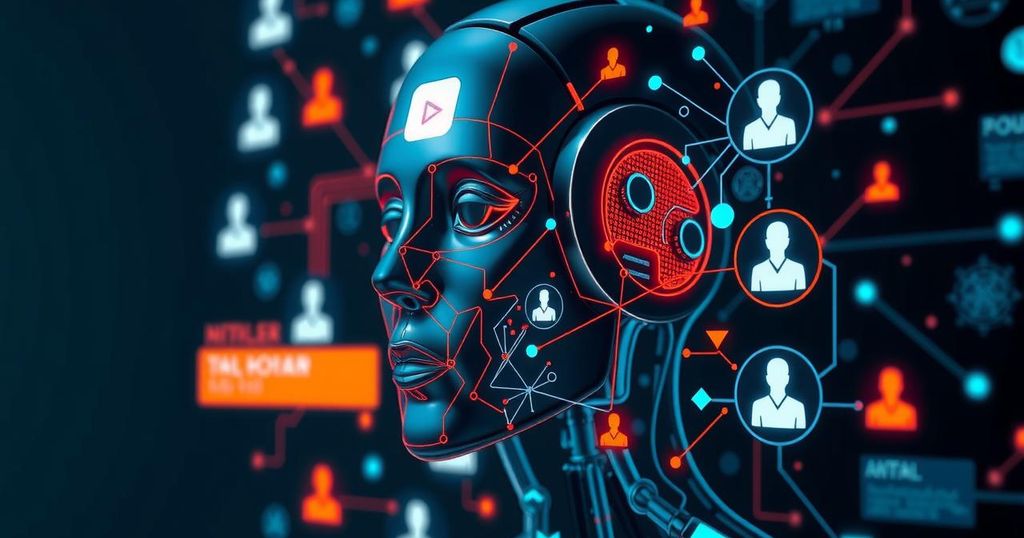Revolutionizing Consumer Insights: The Rise of AI Replicas
Researchers from Stanford and Google DeepMind have developed AI replicas that simulate consumer responses with 85% accuracy from two-hour conversations. This innovation could eliminate the need for traditional focus groups, allowing businesses to better understand consumer behavior and preferences through virtual simulations. AI could additionally enhance customer service training, offering safe environments to practice diverse interaction strategies.
Imagine stepping into a world where understanding consumer sentiment doesn’t necessitate tempting individuals with slices of pizza or enticing gift cards. Researchers at Stanford and Google DeepMind have unlocked a revolutionary method to create AI replicas of consumers, crafted from engaging two-hour conversations. This breakthrough signals the dawn of a new era in market research, where virtual focus groups can operate without the usual complaints about parking woes or time extensions, generating insights with astounding accuracy.
In a study involving 1,000 diverse participants—varying in age, race, education, and ideology—researchers conducted in-depth interviews touching on an array of topics. These interactions birthed AI personas capable of mimicking human responses to personality assessments and social surveys with an 85% precision rate. This technology presents an exciting opportunity for businesses to dive deep into consumer behavior, crafting tailored marketing strategies based on the nuances of digital twins.
Rob Lubeck of RTS Labs emphasized, “By creating digital replicas of target customer personas, businesses can simulate how different personality types respond to various product features.” This simulation not only quickens the pace of testing but also allows businesses to uncover motivations and preferences before engaging actual customers in the decision-making process.
Additionally, these AI personas can serve as training tools for customer support agents, enabling them to fine-tune their strategies for a variety of challenging scenarios—whether defusing conflicts or effectively presenting new offerings. “This approach enables companies to anticipate and address customer needs with greater empathy and precision,” Lubeck stated, painting a future where both service quality and consumer satisfaction soar.
Beyond marketing, the concept of digital twins is reshaping various sectors, from healthcare to manufacturing. These virtual models enhance operational efficiency and streamline processes by simulating real-world scenarios—think of a digital heart traversing the intricacies of cardiac function. As industries eye the potential of AI-powered simulations, businesses like BMW integrate human simulations into assembly planning to refine ergonomic practices and improve workflow efficiency. In healthcare, the ability to offer consistently exceptional customer service while maintaining compliance is paramount, making AI simulations invaluable.
Saul Marquez, a digital healthcare marketing expert, remarked, “One of the most common pain points I’ve seen come up over and over again for the healthcare executives…is the challenge of providing consistently great customer service…” AI-driven training simulations can bridge this gap, empowering teams to master the art of communication in the sensitive medical landscape.
Thus, as technology advances, the demise of traditional focus groups seems inevitable, making way for digital simulations that promise to enrich our understanding of consumer behavior, fueling innovation wherever they tread.
The advent of AI technology and its growing capabilities are set to redefine market research methodologies. Researchers at Stanford and Google DeepMind have pioneered a breakthrough in creating AI replicas of consumers from lengthy discussions, making a compelling case for substituting traditional focus groups. This shift could enhance the efficiency of consumer feedback mechanisms and the quality of market insights.
The potential for AI replicas to revolutionize consumer research is profound, offering businesses a viable path to understand customer personas without the limitations of traditional focus groups. By employing digital twins, companies can simulate various interactions and test marketing strategies effectively, refining their outreach approaches. As these technologies develop, they promise not only to streamline operations across industries but also to foster deeper connections with consumers.
Original Source: www.pymnts.com




Post Comment